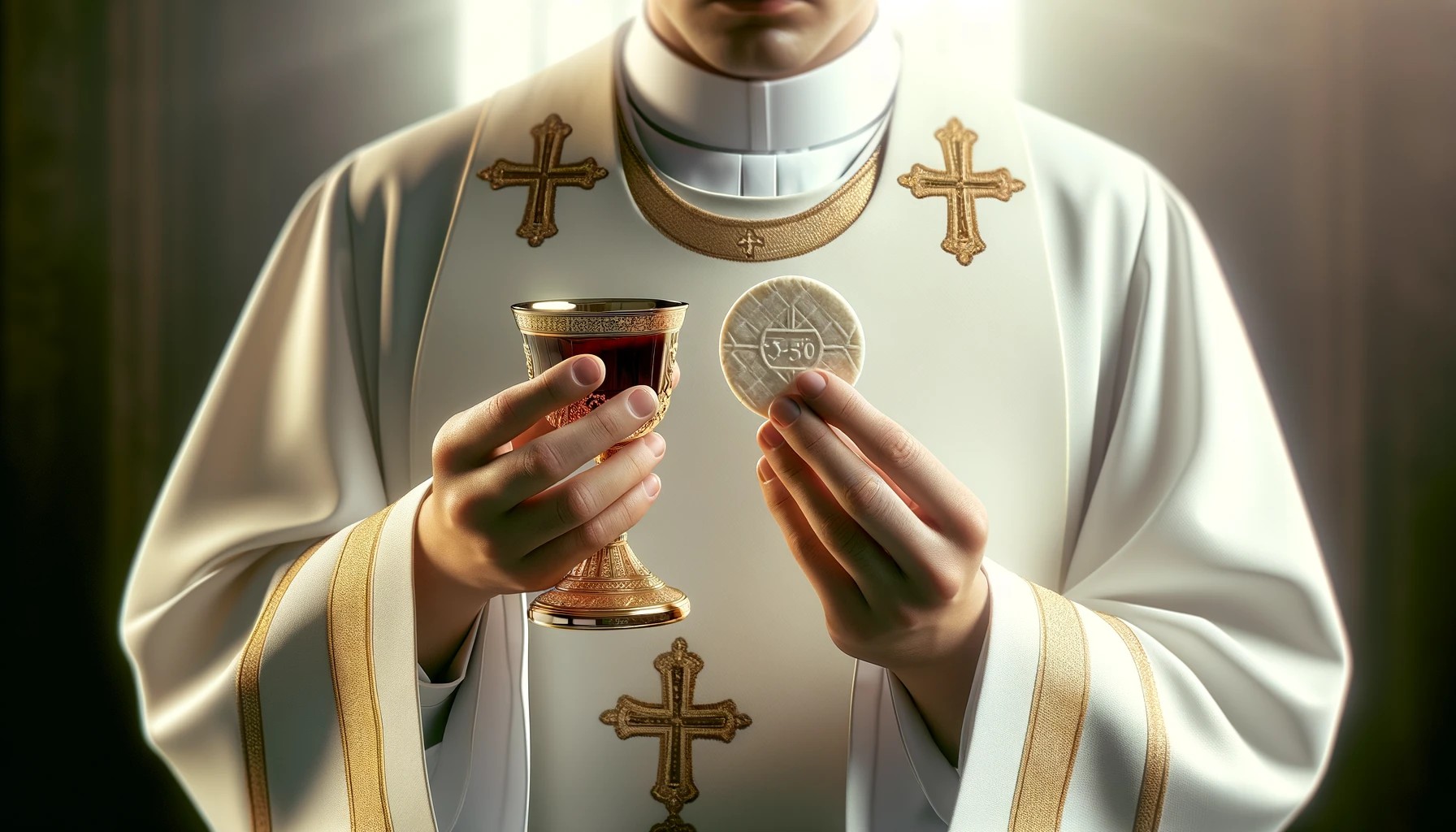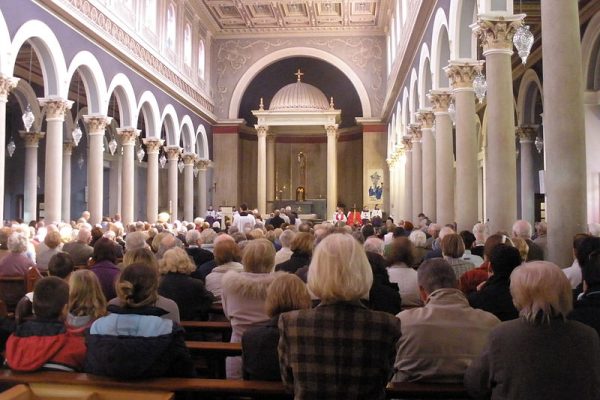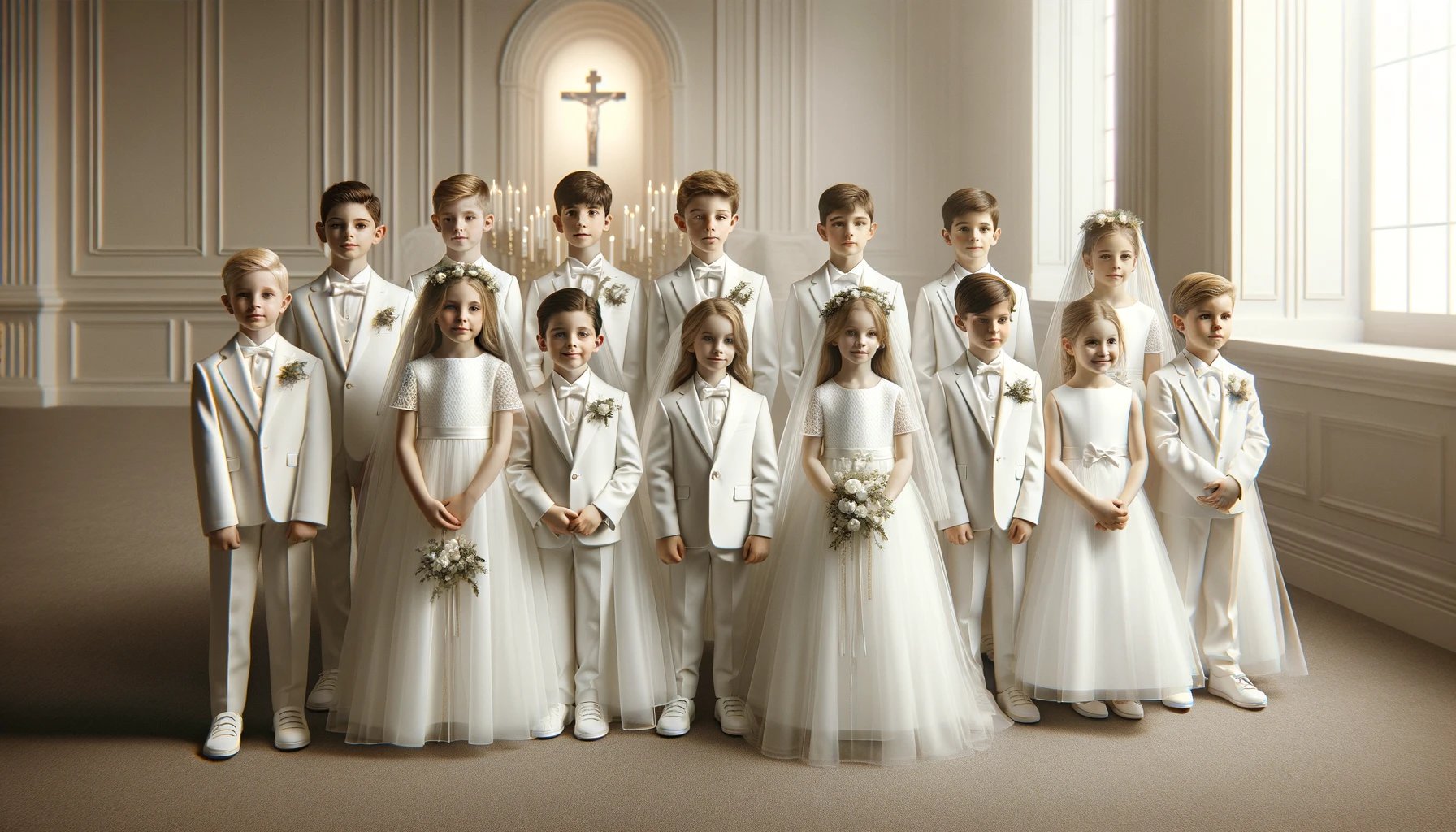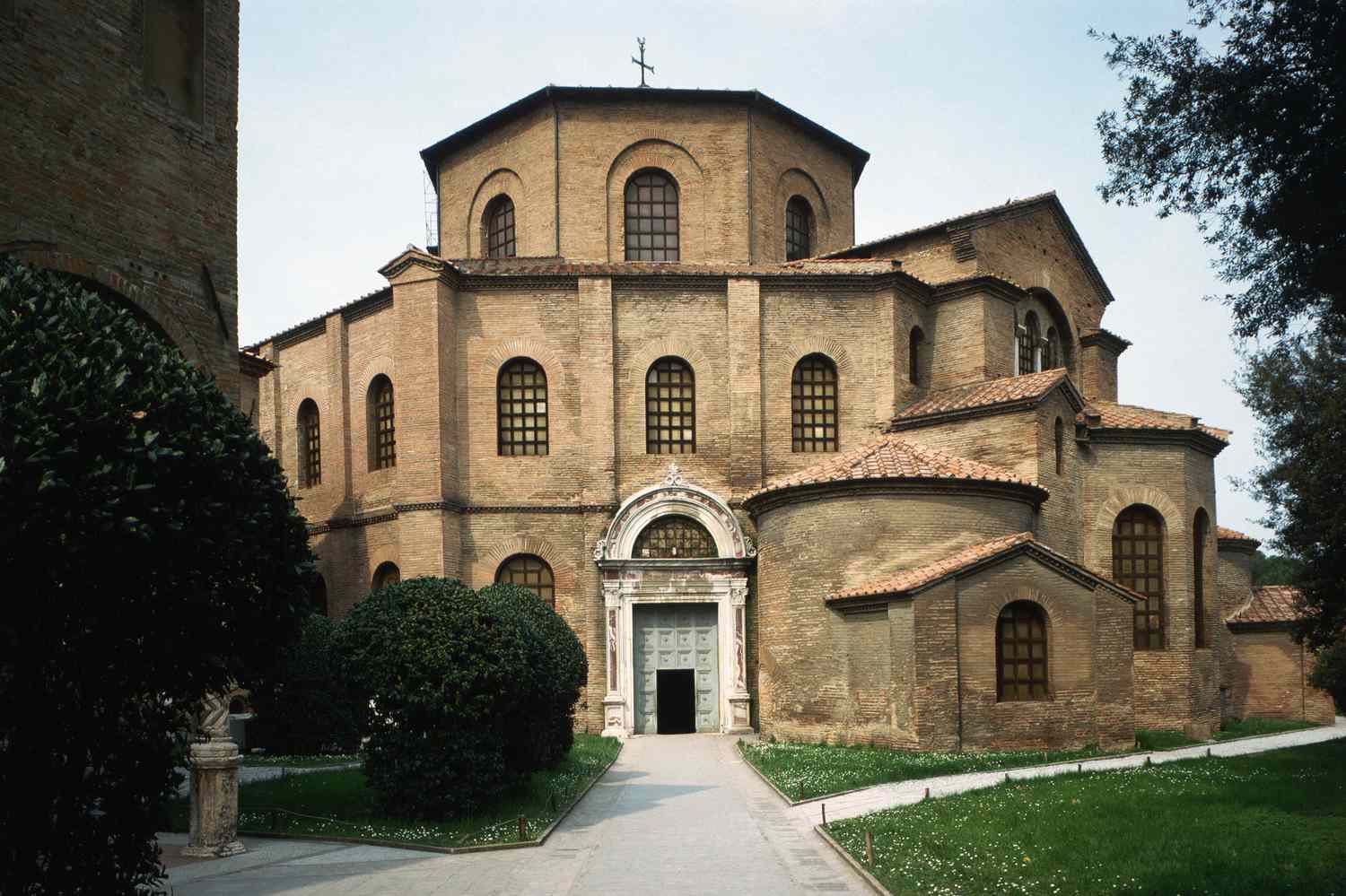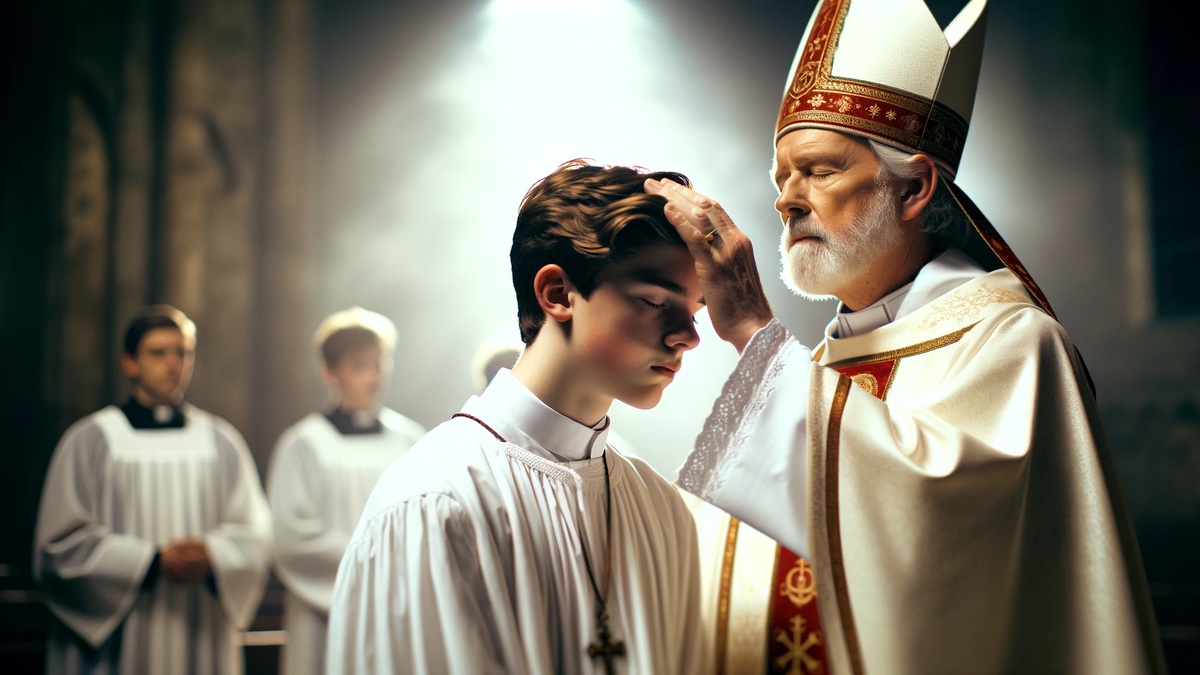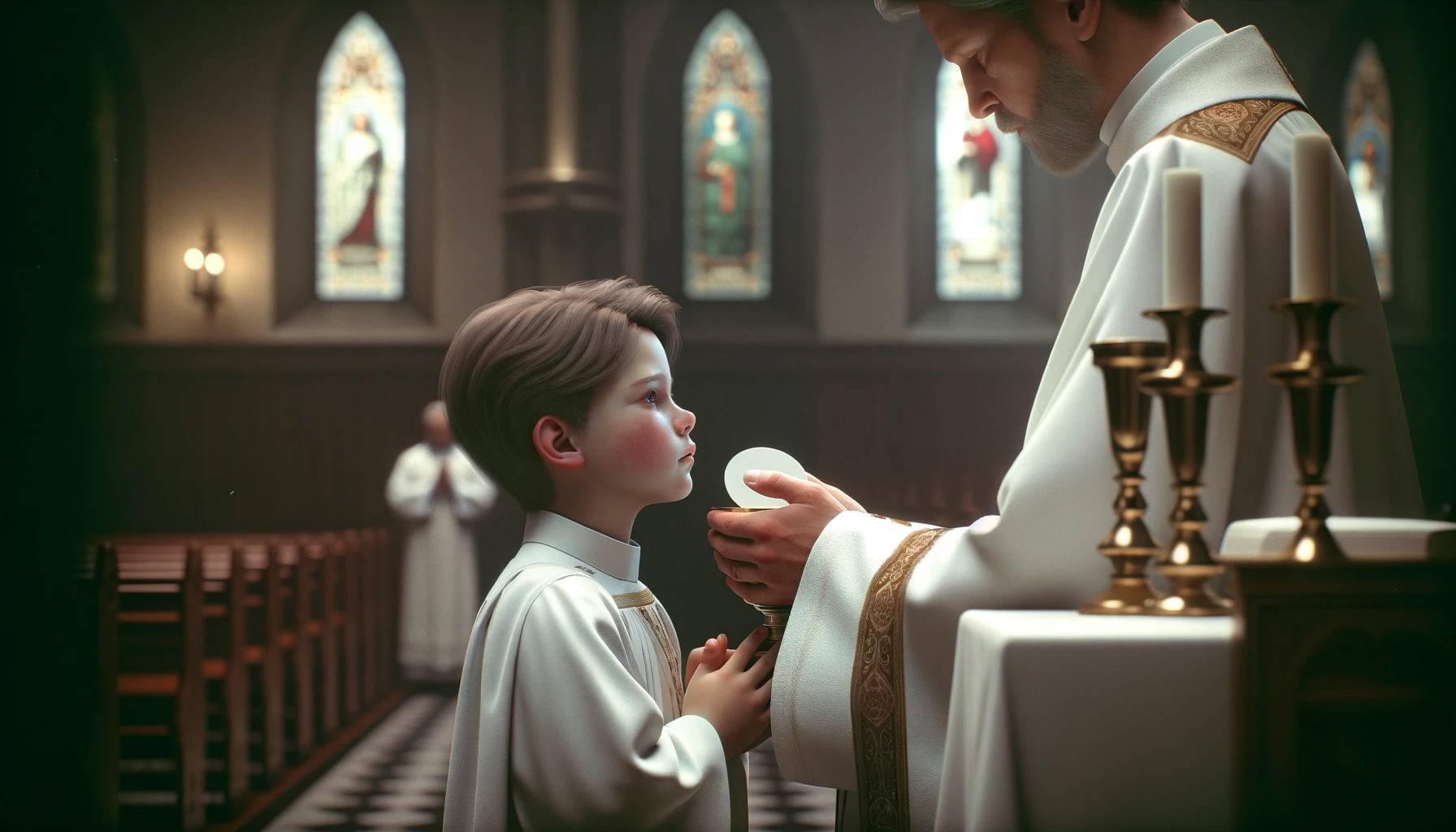Home>Theology and Spirituality>What Happens During A First Communion
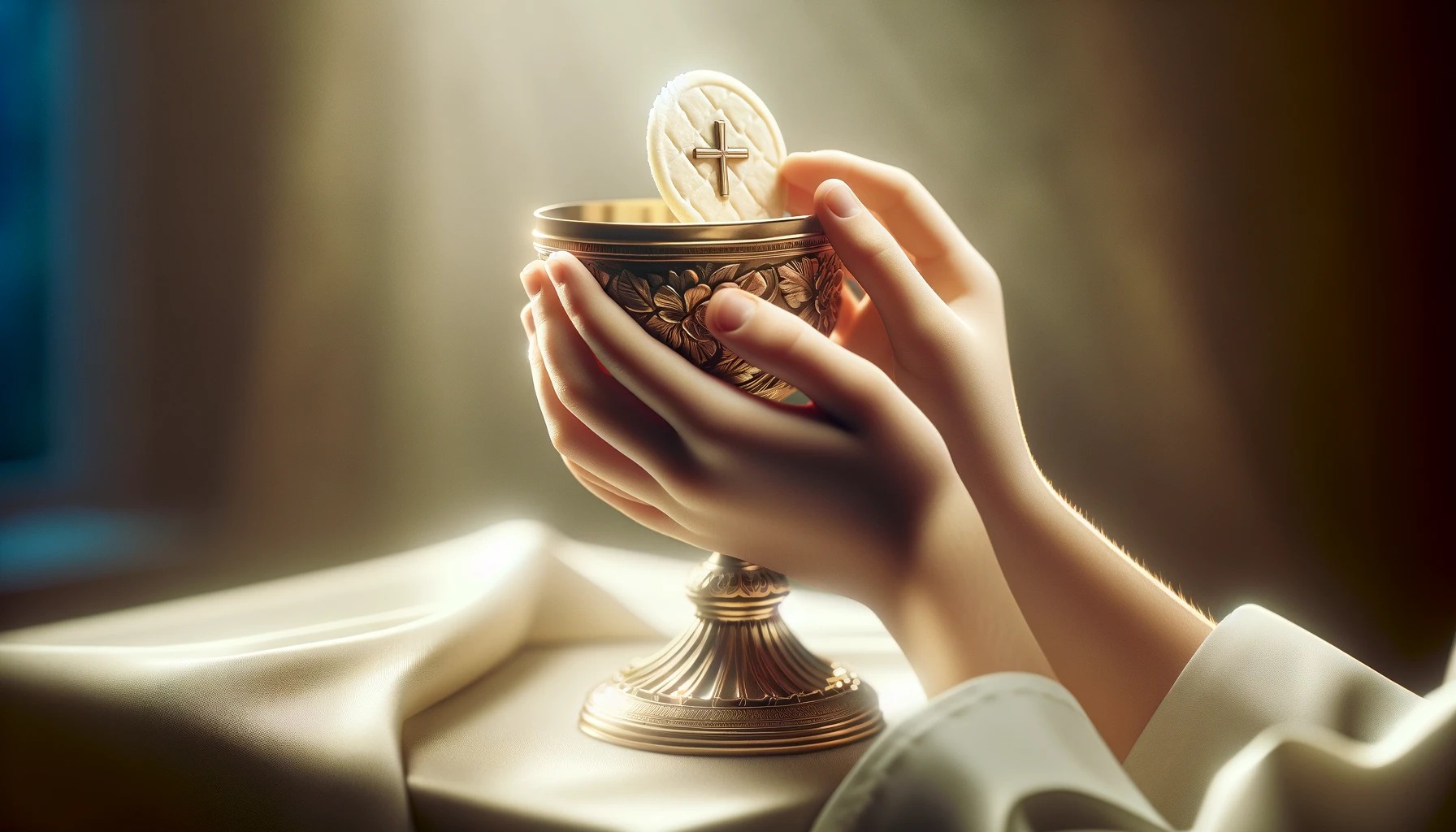

Theology and Spirituality
What Happens During A First Communion
Published: February 19, 2024
Jason DeRose, Managing Editor at Christian.net, uses his expertise in religion and journalism to deepen understanding of faith's societal impacts. His editorial leadership, coupled with a strong academic background, enriches the platform’s diverse content, earning him recognition in both journalism and religious circles.
Discover the significance and traditions of a first communion ceremony in the context of theology and spirituality. Learn what to expect during this important religious milestone.
(Many of the links in this article redirect to a specific reviewed product. Your purchase of these products through affiliate links helps to generate commission for Christian.net, at no extra cost. Learn more)
Table of Contents
Introduction
First Communion is a significant milestone in the lives of young Christians, particularly in the Catholic faith. It is a sacred event that marks the moment when a child receives the Eucharist for the first time, symbolizing their initiation into the full participation of the church's sacramental life. This solemn occasion is filled with deep spiritual meaning and is often celebrated with great joy and reverence by families and communities.
The experience of First Communion is a cherished rite of passage that holds a special place in the hearts of both the children and their families. It is a time of spiritual growth and a profound encounter with the teachings of Jesus Christ. The significance of this event extends beyond the ceremonial aspects, as it represents a pivotal moment in a child's journey of faith and their commitment to living a life guided by Christian principles.
For many children, the anticipation of receiving their First Communion is accompanied by a sense of awe and wonder. It is a time of preparation, learning, and reflection, as they strive to understand the sacred nature of the Eucharist and its role in their spiritual development. Families and religious educators play a crucial role in guiding the children through this process, imparting the values of faith, love, and community that are integral to the sacrament of Holy Communion.
As the day of First Communion approaches, families and communities come together to support and encourage the children, creating a nurturing environment that fosters a deep sense of belonging and spiritual connectedness. The significance of this event is not only felt by the children but also resonates deeply within the hearts of their loved ones, who witness and partake in this profound expression of faith and devotion.
In the following sections, we will delve into the various aspects of First Communion, exploring its significance, the preparations involved, the ceremonial proceedings, and the traditions associated with this sacred event. By gaining a deeper understanding of First Communion, we can appreciate the rich tapestry of spiritual significance and cultural traditions that encompass this momentous occasion in the lives of young Christians.
Read more: What Happens During The Communion Rite
The Significance of First Communion
First Communion holds profound significance in the lives of young Christians, particularly those in the Catholic faith. It is a sacred and pivotal moment that marks a child's initiation into the full participation of the church's sacramental life. At its core, First Communion represents the beginning of a deeper spiritual journey and a closer relationship with God.
The reception of the Eucharist during First Communion symbolizes the child's acceptance of the body and blood of Jesus Christ, as well as their commitment to living a life guided by Christian principles. This act of partaking in the Eucharist is a tangible expression of the child's faith and devotion, signifying their readiness to embrace the teachings of Jesus and become active members of the church community.
Moreover, First Communion serves as a foundational step in the sacramental life of the child, paving the way for their participation in other important rites such as Confirmation and Marriage. It is a moment of spiritual growth and a significant milestone in the child's journey of faith, marking their transition from simply learning about the faith to actively experiencing and embodying its principles.
The sacrament of First Communion also fosters a sense of unity and belonging within the church community. It reinforces the child's connection to the larger body of believers and instills a deep understanding of the communal aspect of the Christian faith. Through this shared experience, children are encouraged to develop a sense of empathy, compassion, and solidarity with their fellow believers, nurturing a spirit of togetherness and mutual support within the church.
Furthermore, First Communion is a time of celebration and joy for families and communities. It is an opportunity for loved ones to come together and witness the spiritual growth of the children, offering support, encouragement, and guidance as they take this significant step in their faith journey. The event is often marked by special gatherings, feasts, and expressions of love and pride, creating lasting memories that strengthen familial and communal bonds.
In essence, the significance of First Communion extends far beyond the ceremonial aspects. It represents a profound encounter with the teachings of Jesus Christ, a commitment to living a life guided by Christian values, and a celebration of spiritual growth within the context of a loving and supportive community. This sacred event holds a special place in the hearts of young Christians and their families, shaping their understanding of faith, love, and the enduring presence of God in their lives.
Preparing for First Communion
The period of preparation for First Communion is a time of profound significance and spiritual growth for children in the Catholic faith. It is a journey that encompasses both educational and spiritual dimensions, as young believers embark on a path of learning, reflection, and personal discovery in anticipation of receiving the Eucharist for the first time.
The preparation process typically begins months in advance, allowing children to engage in a comprehensive program that equips them with the knowledge and understanding necessary to fully appreciate the sacred nature of the Eucharist. This educational component often includes catechism classes, where children learn about the significance of the Eucharist, its biblical foundations, and the rituals and prayers associated with Holy Communion. Through these classes, children gain a deeper understanding of the spiritual and theological underpinnings of the Eucharist, enabling them to approach this sacrament with reverence and awe.
In addition to formal instruction, the preparation for First Communion also involves spiritual formation and personal reflection. Children are encouraged to cultivate a prayerful disposition, nurturing their relationship with God through regular prayer and contemplation. This spiritual dimension of preparation fosters a sense of intimacy with the divine and instills in children a profound awareness of the presence of God in their lives. It also serves to deepen their understanding of the significance of the Eucharist as a sacred encounter with the living Christ.
Furthermore, the process of preparing for First Communion extends beyond the classroom and the home, encompassing the active participation of families and the broader church community. Parents, guardians, and religious educators play a pivotal role in guiding and supporting the children throughout this journey, offering encouragement, spiritual guidance, and a nurturing environment that fosters a sense of belonging and connectedness.
As the day of First Communion draws near, children engage in a period of reflection and introspection, preparing their hearts and minds to receive the Eucharist with reverence and gratitude. This involves participating in the sacrament of Reconciliation, also known as Confession, where children have the opportunity to seek forgiveness for their sins and reconcile with God and the church community. This sacramental encounter serves as a profound moment of spiritual renewal, enabling children to approach the reception of the Eucharist with a cleansed and contrite heart.
In essence, the preparation for First Communion is a holistic and transformative process that encompasses intellectual, spiritual, and communal dimensions. It is a time of learning, prayer, and self-examination, as children prepare to partake in the sacred banquet of the Eucharist. Through this comprehensive preparation, young believers are equipped to approach First Communion with reverence, understanding, and a deep sense of spiritual readiness, marking the beginning of a lifelong journey of faith and communion with God.
The Ceremony of First Communion
The ceremony of First Communion is a deeply reverent and joyous occasion that holds profound spiritual significance for the children and their families. It is a sacred rite that marks the culmination of the preparation process and the eagerly anticipated moment when the children receive the Eucharist for the first time. The ceremony typically takes place within the context of a solemn Mass, where the children, adorned in their finest attire, gather with their families and the church community to partake in this sacred event.
As the ceremony commences, the atmosphere is imbued with a sense of reverence and anticipation. The children, accompanied by their parents and sponsors, process into the church, symbolizing their readiness to receive the body and blood of Jesus Christ. The procession is often accompanied by hymns and prayers, creating a solemn and uplifting ambiance that underscores the sacred nature of the occasion.
During the Mass, the children actively participate in the liturgy, taking on special roles such as altar servers, lectors, and gift bearers, which further enriches their engagement with the sacramental celebration. The homily delivered by the presiding priest may center on the significance of the Eucharist and the children's role in embracing the teachings of Jesus Christ, reinforcing the spiritual gravity of the event.
The pinnacle of the ceremony unfolds as the children approach the altar to receive the Eucharist. With hearts filled with reverence and awe, they partake in the sacred ritual of consuming the consecrated bread and wine, symbolizing their union with Christ and the larger community of believers. This moment is often accompanied by a profound sense of spiritual fulfillment and joy, as the children experience the tangible presence of Jesus in the Eucharist for the first time.
Following the reception of the Eucharist, the children and their families are often invited to offer prayers of thanksgiving, expressing gratitude for the blessings bestowed upon them during this momentous occasion. The ceremony concludes with a final blessing from the presiding priest, sending forth the children and their families with the grace and love of God, as they continue their journey of faith and spiritual growth.
In essence, the ceremony of First Communion is a sacred and transformative experience that marks the beginning of a deeper communion with God and the church community. It is a celebration of faith, love, and unity, as the children embrace the teachings of Jesus Christ and embark on a lifelong journey of spiritual devotion and service. The ceremony serves as a poignant reminder of the enduring presence of God in the lives of the young believers, shaping their understanding of faith and fostering a deep sense of spiritual connectedness within the church.
Receiving the Eucharist
The act of receiving the Eucharist during First Communion is a profoundly sacred and transformative experience for young Christians. At the heart of this momentous occasion lies the reception of the consecrated bread and wine, which symbolize the body and blood of Jesus Christ. As the children approach the altar to partake in this sacred ritual, they are enveloped in a profound sense of reverence, awe, and spiritual anticipation.
The reception of the Eucharist represents a deeply personal encounter with the living Christ. As the children receive the consecrated host, they are invited to enter into a profound communion with Jesus, embracing His teachings and embodying His love and compassion. This act of partaking in the Eucharist signifies the children's willingness to open their hearts to the transformative power of Christ's presence, allowing His grace to permeate their being and guide them on their journey of faith.
Moreover, the reception of the Eucharist fosters a sense of unity and communion within the church community. As the children partake in the sacred banquet, they become integral participants in the larger body of believers, forging a deep spiritual connection with their fellow Christians. This communion of hearts and spirits transcends individual experiences, creating a sense of shared devotion and solidarity that binds the faithful together in love and faith.
The moment of receiving the Eucharist is also a time of profound gratitude and thanksgiving. As the children consume the consecrated bread and wine, they express their profound appreciation for the gift of Christ's presence in the Eucharist and the abundant grace that flows from this sacred encounter. This act of thanksgiving reinforces the children's awareness of God's enduring love and benevolence, instilling in them a spirit of humility and reverence for the divine mysteries they have just experienced.
In essence, the act of receiving the Eucharist during First Communion is a deeply spiritual and transformative moment that shapes the children's understanding of faith and their relationship with God. It is a sacred encounter that invites them to embrace the teachings of Jesus Christ, foster a sense of unity within the church community, and cultivate a spirit of profound gratitude and reverence for the enduring presence of God in their lives.
Read more: What Happens In A Holy Communion
Traditions and Customs
The celebration of First Communion is steeped in rich traditions and customs that reflect the cultural and spiritual heritage of the Catholic faith. These time-honored practices add depth and meaning to the sacred event, enriching the experience for the children and their families. From traditional attire to symbolic rituals, these customs contribute to the solemnity and joy of First Communion.
One of the most enduring customs associated with First Communion is the attire worn by the children. Girls often don white dresses, symbolizing purity and innocence, while boys don suits or formal attire, signifying their reverence for the occasion. These traditional garments serve as a visual representation of the children's readiness to receive the Eucharist and their commitment to embodying the teachings of Jesus Christ.
In addition to attire, the exchange of religious gifts holds special significance in First Communion traditions. It is customary for the children to receive religious items such as rosaries, crosses, or prayer books, symbolizing their continued spiritual growth and devotion. These gifts serve as tangible reminders of the children's First Communion and are cherished keepsakes that mark this pivotal moment in their faith journey.
The ceremonial aspects of First Communion also encompass time-honored rituals within the church. The children may participate in the presentation of gifts during the Mass, offering symbolic offerings such as bread and wine, which represent their willingness to share in the abundance of God's grace and love. These rituals underscore the communal aspect of the Eucharist and reinforce the children's role as active members of the church community.
Furthermore, First Communion traditions often extend beyond the church ceremony to include celebratory gatherings and feasts. Families and communities come together to commemorate this special occasion, sharing in festive meals and joyful fellowship. These gatherings serve as an expression of gratitude and celebration, uniting loved ones in a spirit of joy and thanksgiving for the children's spiritual milestone.
Overall, the traditions and customs surrounding First Communion are deeply rooted in the cultural and spiritual tapestry of the Catholic faith. They serve to honor the sacred nature of the event, enriching the experience for the children and their families. Through these cherished customs, First Communion becomes not only a personal milestone but also a celebration of faith, love, and unity within the larger church community.
Celebrating First Communion
The celebration of First Communion is a joyous and momentous occasion that holds deep significance for the children, their families, and the broader church community. It is a time of jubilation, gratitude, and spiritual reflection, marking the culmination of the children's preparation and the beginning of a new chapter in their faith journey.
The festivities surrounding First Communion often extend beyond the church ceremony, encompassing a range of celebratory traditions and gatherings that honor the sacred nature of the event. Families and communities come together to commemorate this special milestone, creating an atmosphere of love, support, and shared joy.
One of the central elements of the celebration is the gathering of family and friends. Loved ones from near and far converge to witness and partake in the children's spiritual journey, offering their support, blessings, and expressions of pride. This gathering of loved ones fosters a sense of unity and togetherness, as the community comes together to celebrate the children's commitment to their faith.
The post-ceremony festivities often include special meals and feasts, where families and friends share in the joy of the occasion. These celebratory gatherings are marked by an abundance of food, laughter, and heartfelt conversations, creating cherished memories that strengthen familial bonds and affirm the children's place within a loving and supportive community.
In addition to communal gatherings, the children often receive gifts and tokens of love and encouragement from their families and sponsors. These gifts, ranging from religious mementos to personal keepsakes, serve as tangible reminders of the children's First Communion and symbolize the enduring support and guidance they receive as they continue their journey of faith.
Moreover, the celebration of First Communion extends beyond the immediate community, often involving the participation of the broader church congregation. The children are warmly welcomed into the larger body of believers, receiving the collective prayers, blessings, and well-wishes of the church community, further reinforcing their sense of belonging and spiritual connectedness.
Overall, the celebration of First Communion is a time of profound joy, love, and communal solidarity. It is a testament to the enduring presence of faith, the power of love, and the transformative impact of spiritual milestones in the lives of young believers. Through these celebrations, the children are enveloped in a supportive and nurturing environment, where their commitment to their faith is honored, cherished, and celebrated with boundless love and joy.
Conclusion
The sacrament of First Communion represents a sacred and transformative milestone in the lives of young Christians, particularly those in the Catholic faith. It is a time of profound spiritual significance, marking the moment when children receive the Eucharist for the first time and symbolizing their initiation into the full participation of the church's sacramental life. The significance of this event extends beyond the ceremonial aspects, as it represents a pivotal moment in a child's journey of faith and their commitment to living a life guided by Christian principles.
Throughout the preparation process, children engage in a comprehensive program that equips them with the knowledge and understanding necessary to fully appreciate the sacred nature of the Eucharist. This educational component is complemented by spiritual formation and personal reflection, fostering a deep sense of intimacy with the divine and instilling in children a profound awareness of the presence of God in their lives.
The ceremony of First Communion, often held within the context of a solemn Mass, is a deeply reverent and joyous occasion. As the children approach the altar to receive the Eucharist, they are enveloped in a profound sense of reverence, awe, and spiritual anticipation. This act of partaking in the Eucharist signifies the children's willingness to open their hearts to the transformative power of Christ's presence, allowing His grace to permeate their being and guide them on their journey of faith.
The celebration of First Communion is a joyous and momentous occasion that holds deep significance for the children, their families, and the broader church community. It is a time of jubilation, gratitude, and spiritual reflection, marking the culmination of the children's preparation and the beginning of a new chapter in their faith journey. Families and communities come together to commemorate this special milestone, creating an atmosphere of love, support, and shared joy.
In essence, First Communion is a sacred event that shapes the understanding of faith, love, and the enduring presence of God in the lives of young Christians. It fosters a sense of unity and communion within the church community, marking the beginning of a deeper spiritual journey and a closer relationship with God. The traditions, customs, and celebrations associated with First Communion enrich the experience, creating lasting memories and strengthening familial and communal bonds. Through this sacred event, children are embraced by a loving and supportive community, where their commitment to their faith is honored, cherished, and celebrated with boundless love and joy.


